 French Jews have long had a privileged relationship with their country’s intellectual life. Sometime they have been an object of intellectual effervescence – as at the time of the Dreyfus Affair, which occasioned the invention of the very term “intellectual” – and sometimes, as Jonathan Judaken has recently noted, they have been the standard bearers of the French tradition of the public intellectual, as when figures such as Bernard-Henri Lévy fulfilled the role of prescient Jeremiah (and more) in the 1960s, 1970s, and 1980s.
French Jews have long had a privileged relationship with their country’s intellectual life. Sometime they have been an object of intellectual effervescence – as at the time of the Dreyfus Affair, which occasioned the invention of the very term “intellectual” – and sometimes, as Jonathan Judaken has recently noted, they have been the standard bearers of the French tradition of the public intellectual, as when figures such as Bernard-Henri Lévy fulfilled the role of prescient Jeremiah (and more) in the 1960s, 1970s, and 1980s.
That tradition is alive and well, although it has recently taken an unusual turn. Currently a handful of French-Jewish intellectuals are fighting a battle in which theirs are virtually the only voices of dissent against a crippling liberal consensus known in French as the “pensée unique,” a movement of thought that severely constricts the range of perspectives permitted within French academia, the French press, and French political culture alike. These Jewish philosophes are generally of a rightward bent, although they have no truck with France’s traditional conservative ideologies, which, rooted in the country’s long counter-revolutionary traditions and indelibly stained by the anti-Dreyfus movement and Vichy, offer Jews no home. Rather, they are not unlike America’s neo-conservatives – apostate Leftists who once rallied to the 1968 student movement but who now critique the Left, albeit in the name of the Enlightenment values that, they argue, the Left too readily betrays. They define themselves as sworn enemies of totalitarianism in all its forms, and, unlike American neo-cons, evoke a kind of liberalism which, while familiar to Americans and Britons, never really took root south of the Channel, and reflects a morals-based approach that eschews doctrine. Finally, and perhaps fatally for the French-Jewish intellectual tradition, these new intellectuals have increasingly evinced a touch of what might be called the Pym Fortuyn Syndrome: a fear of Islam and Islamism based on the threat they pose to liberal culture.
Naming Names
Who are these Jewish intellectuals? The anti-Semitic Genevan Imam Tariq Ramadan provided a fine list in an October 2003 rant liberally reprinted in Le Monde and elsewhere: Alain Finkielkraut, Alexandre Adler, Bernard Kouchner, André Glucksmann, Pierre-André Taguieff (who isn’t actually Jewish), and Bernard-Henri Lévy [see article], all accused by Ramadan of supporting Israel and the American-led war in Iraq. Says Ramadan, these sins indicate that this group of intellectuals is guilty of betraying the French Enlightenment’s universal values in favor of the Jewish communities’ particular interests. Indeed, in Ramadan’s rant — published in the leading French newspaper of the day — they are all agents of Ariel Sharon, working in parallel to the Jewish cell controlling American foreign policy.
Ramadan’s remarks were invited by Le Monde, whose editorial policies themselves occasionally flirt with antisemitism and which, in March 2003, itself ran a list of the same intellectuals under the title “In France, these intellectuals who say ‘yes’ to war.” Without addressing the many differences of opinion and even reservations about the war that separate the individuals in question, Le Monde included in its list (together with several others) most of the same figures: André Glucksmann, Pascal Bruckner, Romain Goupil, Bernard Kouchner, Alain Finkielkraut, Jacky Mamou, Pierre Lellouche, Michel Taubmann, and Shmuel Trigano. All of them happen to be Jewish.
The war in Iraq is indeed one of the issues on which France’s Jewish intellectuals distinguish themselves, although their positions tend to be far more ambivalent than “yes to war.” Rather, the usual argument is that the war, whatever its disadvantages, is at least 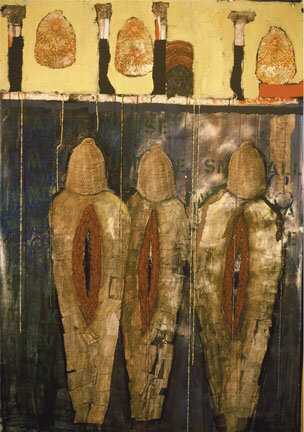 morally correct insofar as Saddam Hussein was an evil genocidal tyrant whom the French should be ashamed to have once supported. Bernard-Henri Lévy, for example, has frankly and consistently condemned the war on pragmatic grounds, foremost among them that the United States went after the wrong target. Yet he wrote this past March that the war’s morality was nonetheless “unattackable.”
morally correct insofar as Saddam Hussein was an evil genocidal tyrant whom the French should be ashamed to have once supported. Bernard-Henri Lévy, for example, has frankly and consistently condemned the war on pragmatic grounds, foremost among them that the United States went after the wrong target. Yet he wrote this past March that the war’s morality was nonetheless “unattackable.”
More than the Iraq war, however, it is the question of immigration that looms as France’s greatest challenge, and it is on that issue that France’s Jewish intellectuals are marking their greatest distance from the country’s liberal consensus. Two figures in particular stand out: Albert Memmi, the venerable fellow traveler of Jean-Paul Sartre whose leftist, third-worldist credentials are indisputable, and Alain Finkielkraut, who made his career defending the universalist orthodoxy of French Republicanism (itself a particularly Jewish career in the spirit of Adolphe Crémieux and Léon Blum). Both have sounded the alarm against the perceived perils posed by the Muslim community. For various reasons, Memmi escaped public wrath, and Finkielkraut was not so lucky.
Memmi Takes Stock
Albert Memmi made his name in 1957 when he published Portrait of a Colonized/Portrait of a Colonizer, a book which dissects with extraordinary clarity the reciprocal pathologies of colonialism [see article]. As a former indigenous subject of French rule in colonial Tunisia, Memmi always insisted on his place alongside the colonized, whose cause he never doubted. However, he also insisted that after decolonization the burden fell upon the formerly colonized peoples to transcend the circumstances which the colonizers had bequeathed to them. They also had to heal themselves.
Almost fifty years later, Memmi has cast a scornful eye on the former colonized peoples of the world, and concluded that they had made little progress. In 2004, he wrote Portrait of the Decolonized to describe the 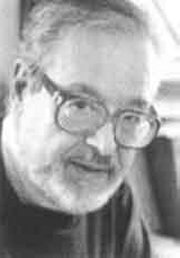 failure of decolonized peoples to move beyond their traumas and cease being defined by the colonial experience. Fifty years after independence, Memmi notes in the book, most former colonies are actually even worse off than they were under European tutelage, with political, economic and cultural conditions all having decayed. Memmi has little patience for the reflexive excuses often made in its defense – mystifications, as he describes them, that explain problems most often in terms of the persistence of colonial power and the traumas of colonial rule:
failure of decolonized peoples to move beyond their traumas and cease being defined by the colonial experience. Fifty years after independence, Memmi notes in the book, most former colonies are actually even worse off than they were under European tutelage, with political, economic and cultural conditions all having decayed. Memmi has little patience for the reflexive excuses often made in its defense – mystifications, as he describes them, that explain problems most often in terms of the persistence of colonial power and the traumas of colonial rule:
The young nations have been independent for fifty years; they have had all the time necessary to reform themselves and to erase, if they really wanted to, the negative after-effects of their earlier state of subjugation. Memmi, Portrait of a Colonized, pp. 83-84
Memmi’s strongest attacks are on the “Arabo-Muslim” world, which he derides as fundamentally “sick,” particularly in light of their indulgence of terrorism and suicide bombings.
If one can employ here the language of medicine, one could say that Arabo-Muslim society suffers from a grave depressive syndrome that prevents it from perceiving an escape from its current state. The Arab world still has not discovered, or wanted to consider, the transformations that would finally adapt it to the modern world that is coming at it from all directions. Instead of examining itself, and in function of this diagnostic, of taking the remedies required, it searches in others the causes of its disfunctions. It is the fault of the Americans, or the Jews, the miscreants, the infidels, the multinationals…Through a classic phenomenon of projection, the Arab world also blames others for all sins, depravations, loss of values, materialism, atheism, etc. Id., pp. 33-36
The Arab-Israeli conflict, Memmi claims, is just an excuse. Calling it minor by every measure when compared to so many of the planet’s other conflicts, Memmi claims that it “illustrates and supports two myths of compensation and revindication that are always alive among the Arabs,” first that “if the Arabs unified they would be able to become again a power comparable if not superior to that of their past empires,” and second that Israel is all that stands in their way. Together, Memmi says, the two myths have sustained Arab passions while diverting them from more constructive pursuits, a problem he links to the “resignation” of intellectuals in the Arab world, who are incapable or unwilling to break with their societies’ dogma and taboos.
Arabo-Muslim intellectuals finally have to lean on a tradition other than submission to dogma and power and lining up with public opinion. Or, there no longer exists, if it ever existed, in the Arabo-Muslim world, this great public tribunal necessary for democracy where each can, contradictorily, express his opinion without excessive risk. Id., p. 49
====
In an interview published in June 2004 in L’Express magazine, Memmi expressed skepticism that such a “Reformation” is even possible. “The link between religion and society” is too anchored in Arab mentalities and the Arab consciousness, and in “a philosophy in which the religious and the profane coincide, which is contrary to the exercise of a critical spirit. Without a critical spirit, you cannot have before nature the liberty of thinking that is indispensable for mastering it. For criticism is forbidden in most Arab countries, under pain of prison or exile.” (Albert Memmi, “Les Arabes ne peuvent qu’accepter les valuers de l’Occident,” L’Express, June 14, 2004.)
Critically, Memmi does not spare the former colonized who have settled in France, nor their children, who concern him the most:
The son of the immigrant is a sort of zombi, without deep attachment to the soil on which he was born. He is a French citizen, but he does not exactly feel French; he only partially shares the culture of the majority of his fellow citizens, and not at all the religion. But neither is he an Arab…truly he is from another planet: the suburb. Memmi, Portrait, p. 141
Memmi’s suburb roughly approximates the American inner city, a place where the police seldom tread and where “youths” (Memmi notes the French preference for that vague term rather than anything that might specify which kind of youths) fabricate their own identities around delinquency and the adaptation of American hip-hop culture. Graffiti, rap, and vandalism, particularly the burning of cars: these are the aesthetic gestures of “protest and provocation” of the sons of France’s decolonized immigrants. Finally and perhaps despairingly, Memmi has lately questioned whether or not France can ever acculturate its new minorities, both because of the resistance within the Muslim community, and reluctance within the larger French one.
Finkielkraut Agonistes
It is here where Alain Finkielkraut takes up the baton, although in an altogether different context. On November 18, 2005, the Israeli newspaper Haaretz published an interview with Finkielkraut about the riots that were then setting the immigrant suburbs of Paris and other cities ablaze. (A translation appeared here. Finkielkraut’s stance paralleled Memmi’s — critiquing the state of France’s “Arabo-Muslim” minorities in the name of 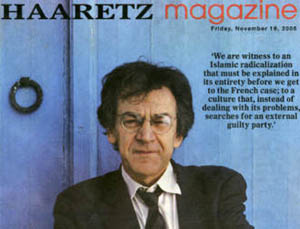 Enlightenment and French Republican values — but unlike Memmi, Finkielkraut lost editorial control (and perhaps control of his tongue), and various media, beginning with Haaretz itself, repeatedly repacked his views to as to make them all the more newsworthy.
Enlightenment and French Republican values — but unlike Memmi, Finkielkraut lost editorial control (and perhaps control of his tongue), and various media, beginning with Haaretz itself, repeatedly repacked his views to as to make them all the more newsworthy.
In the Haaretz interview, which presented Finkielkraut as a “deviant, even very deviant voice,” Finkielkraut denounced the tendency of the makers of French public opinion to find excuses for the violence by blaming it as the natural response to French racism and the social conditions of the rioters. “In France,” he said, they would like very much to reduce these riots to their social dimension, to see them as a revolt of youths from the suburbs against their situation, against the discrimination they suffer from, against unemployment.” But Finkielkraut placed the blame on the rioters themselves, and thought it no accident that the rioters were the descendents of black African and North African immigrants, nearly all of them Muslims:
The problem is that most of these youths are blacks or Arabs, with a Muslim identity. Look, in France there are also other immigrants whose situation is difficult—Chinese, Vietnamese, Portuguese – and they’re not taking part in the riots. Therefore, it is clear that this is a revolt with an ethno-religious character…Is this the response of the Arabs and blacks to the racism of which they are victims? I don’t believe so, because this violence had very troubling precursors, which cannot be reduced to an unalloyed reaction to French racism.
Finkielkraut contrasted the rioters’ actions with that of his own family, this time with reference to the Holocaust:
My father was deported from France [to Auschwitz]…This country deserves our hatred: What it did to my parents was much more violent that what it did to Africans. What did it do to Africans? It did only good. It put my father in hell for five years. And I was never brought up to hate. And today, this hatred that the blacks have is even greater than that of the Arabs.
Noting that Arab youths booed the national anthem and the French flag at a football match between France’s famously multi-racial national team and Algeria’s, Finkielkraut asserted that he saw
[the] very declarations of hatred for France. All of this hatred and violence is now coming out in the riots. To see them as a response to French racism is to be blind to a broader hatred: the hatred for the West, which is deemed guilty of all crimes.
Finally, particularly incensed that the rioters’ favorite target was the school, an institution he had long lauded as the Republic’s pre-eminent tool for emancipation, Finkielkraut concluded that the riots were tantamount to an “anti-Republican pogrom.” He said that the rioters hated the Republic not because of any past colonial sins, but because the Republic, retrospectively and according to the resentment nourished by the Muslim minorities, was a stand-in for the abstract “victimizer” to blame 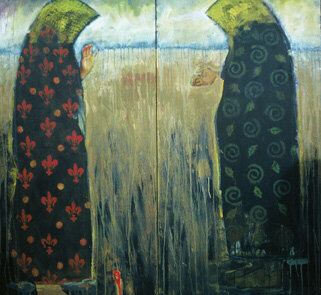 for the “victim’s” ills. Finkielkraut saw in the riots the failure of the “multicultural” model, and feared that the perceived failure would lead the French public to conclude precisely the wrong thing: that schools had to become “nicer.” In fact, well-intentioned French intellectuals and public officials, he complained, were partially to blame, for exaggerating of France’s history of colonialism and slavery and fostering an identity of victimhood and resentment — and while attacking the memory of the Holocaust.
for the “victim’s” ills. Finkielkraut saw in the riots the failure of the “multicultural” model, and feared that the perceived failure would lead the French public to conclude precisely the wrong thing: that schools had to become “nicer.” In fact, well-intentioned French intellectuals and public officials, he complained, were partially to blame, for exaggerating of France’s history of colonialism and slavery and fostering an identity of victimhood and resentment — and while attacking the memory of the Holocaust.
The Haaretz interview touched off a scandal. Portions immediately began circulating in French, and on November 23, the leftist French anti-racism organization Movement Against Racism and for Friendship Among Peoples (MRAP) filed a suit against Finkielkraut for inciting racial hatred. On November 24 Le Monde’s editor, Sylvain Cypel, smelled blood. He lifted the most provocative lines from Haaretz and published them out of context in the guise of an interview synopsis under the headline “The ‘Very Deviant’ Voice’ of Alain Finkielkraut in the Daily Haaretz.”
Finkielkraut tried to stem the damage. He appeared on the Europe 1 radio network seeking to apologize and explain his words. Among other things, Finkielkraut disavowed the interview’s more extreme language, and attacked its redaction in Le Monde:
From the puzzle of quotations in Le Monde, there emerges an odious person, unlikable, twisted, whose hand I would not want to shake. They tell me – and here the nightmare begins – that that person is me, I am being told that I inhabit that fictional body, and that I must answer for it before the court of public opinion. So I want to defend myself…
The next day, Le Monde printed his rather ambivalent statements (“I apologize to those whom the person who I am not has hurt…the lesson is that I must no longer give interviews with newspapers that I don’t control or the fate or translation of which I cannot control”). MRAP accepted Finkielkraut’s apology and renounced its plans to sue him even though its leader, Mouloud Aounit, “doubted the sincerity of Mr. Finkielkraut’s excuses.”
But the polemics had only just begun. Minister of the Interior Nicolas Sarkozy, who had notoriously referred to the rioters as “rabble,” endorsed Finkielkraut as an “intellectual who brought honor to French intelligence,” noting that “if so many people critize himI it is because what he says is right.” Indeed, according to Sarkozy, it was not Finkielkraut and his fellow conservatives but the liberal consensus that were to blame for the National Front’s recent electoral successes. Sarkozy added,
This is the only result of all those well-intentioned thinkers who live in a salon between the Café de Flore and the Boulevard St. Germain, and who are surprised that France resembles them so little.
Naturally, such an endorsement didn’t help Finkielkraut — labeled by one editorialist “the Sarkozy of the intellectual world” — and his reputation within that influential clique.
====
From Léon Blum to Pym Fortuyn
Where does all this leave the tradition of the French-Jewish intellectual?
First, it is clear that Finkielkraut’s racism, if it can be called that, is obviously not that of the blood and soil nativist, but that of the Enlightenment universalist troubled by another’s perceived particularism. In a sense, this view places him firmly in a troubling French tradition that traces back to Voltaire’s Essai sur les mœurs. The basic idea is that a people who resist or combat the general trend toward a universal culture of reason and civilization by clinging to – or worse, imposing on others – their own particularist (and presumably atavistic) culture are, in effect, “bad” and appropriate objects of intolerance or even coercion. Whether or not this “intolerance of the Left” – in the sense that it is grounded in French Revolutionary traditions rather than Counter-Revolutionary or simply xenophobic ones – is better than “intolerance of the Right” is debatable.
Second, Finkielkraut, notwithstanding these ties to an older French tradition, was clearly running against the current of the liberal consensus that, in sharp contrast to that of the United States, has a hegemonic hold over public 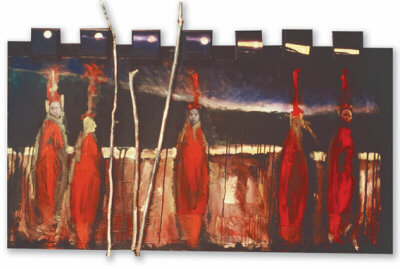 debate. Except for Finkielkraut and his few (and almost entirely Jewish) defenders, no one seriously doubted any of the clichés regarded by most as self-evident: specifically, that the rioters are “poorly socialized” and “marginalized” victims of racism and “arabo-phobia,” all of which make the violence understandable and excusable. Indeed, the prevailing logic – whether in the pages of France’s leading newspapers or on the floor of the National Assembly – was little different from Alvy Singer’s father’s defense of a maid’s theft of silverware in Woody Allen’s Annie Hall, “She’s a colored woman, from Harlem! She has no money! She’s got a right to steal from us! After all, who is she gonna steal from if not us?”
debate. Except for Finkielkraut and his few (and almost entirely Jewish) defenders, no one seriously doubted any of the clichés regarded by most as self-evident: specifically, that the rioters are “poorly socialized” and “marginalized” victims of racism and “arabo-phobia,” all of which make the violence understandable and excusable. Indeed, the prevailing logic – whether in the pages of France’s leading newspapers or on the floor of the National Assembly – was little different from Alvy Singer’s father’s defense of a maid’s theft of silverware in Woody Allen’s Annie Hall, “She’s a colored woman, from Harlem! She has no money! She’s got a right to steal from us! After all, who is she gonna steal from if not us?”
Third, in this departure from the prevailing consensus, Memmi and Finkielkraut are, paradoxically, upholding the tradition of France’s Jewish intellectuals, who as a group distinguish themselves by taking stands that are contrary to the French consensus. Today, that means being to the Right of center, all the while reinforcing their commitment to certain essential Enlightenment and French Republican values. That commitment is as old as the Revolution itself. But the rightward shift away from total universalism – the argument that perhaps some people are too different to be absorbed by France’s civilization and its capacity to emancipate men and women from their atavistic particularisms – is very new. In fact, given the political and intellectual commitments of post-1789 French Jewry, it borders on heresy.
With very few exceptions, French Jews have always staked their destiny on France’s commitment to liberalism, and a vision of France that identifies it with Enlightenment universalism. To defend that France – for there have always been competing visions – they have historically rallied from the center to the left of the political spectrum, from the classical liberalism of the 1830s to various forms of Socialism, and in all cases they understood their particular political tendency to be the best expression of France’s universalizing civilization. With regard to Muslims and colonialism, therefore, it is no accident that France’s three great Jewish statesmen, Adolphe Crémieux, Léon Blum, and Pierre Mendes-France, distinguished themselves by their efforts to square colonialism with liberal values and make French rule in North Africa as liberal, tolerant, and magnanimous as possible. Crémieux at the beginning of colonization in the 1840s was the first to recognize that Jewish emancipation itself was threatened by the prevalent view that Algeria’s indigenous peoples were too different to be made French, and he was one of the early leaders of the fight against militarism and populist racism that flourished in Algeria. Blum in the 1930s and Mendes-France in the 1950s likewise did what they could to make colonial Algeria liberal. They appear earnestly to have believed that Algerian Muslims would renounce their nationalist ambitions and embrace France if France granted them greater political liberties, and both men authored generous reformist legislation.
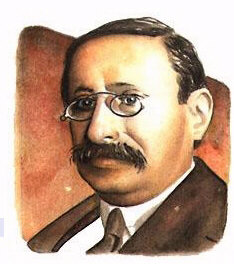 Indeed, for French Jews, faith in humanity’s potential and man’s perfectibility through Enlightenment has always been dogma. Perhaps no better example exists than Léon Blum, who appears never to have noticed the vociferous antisemitic libels made almost daily against him, and who spent his years in a Nazi concentration camp translating Goethe and meditating on the glories of humanity. After liberation he took up the pen to defend his German captors, and he petitioned Charles De Gaulle to spare the lives of Philippe Pétain and the Vichy Prime Minister, Pierre Laval (De Gaulle commuted Pétain’s death sentence but sensibly had Laval shot).
Indeed, for French Jews, faith in humanity’s potential and man’s perfectibility through Enlightenment has always been dogma. Perhaps no better example exists than Léon Blum, who appears never to have noticed the vociferous antisemitic libels made almost daily against him, and who spent his years in a Nazi concentration camp translating Goethe and meditating on the glories of humanity. After liberation he took up the pen to defend his German captors, and he petitioned Charles De Gaulle to spare the lives of Philippe Pétain and the Vichy Prime Minister, Pierre Laval (De Gaulle commuted Pétain’s death sentence but sensibly had Laval shot).
Albert Memmi and Alain Finkielkraut would insist that they have betrayed neither Blum’s humanism nor the idea of France Crémieux, Blum, and Mendes-France held so dear. They claim, rather, to be realists offering a sober assessment to threats against their liberal France. Of course, whether they are on the correct side of the immigration issue, or any other one for that matter, is debatable. But is their France still liberal – is their Enlightenment still universal – if they believe not just that French lumières can’t penetrate certain corners but that those corners menace the rest of France with darkness? For better or for worse, Memmi and Finkielkraut have hit upon one of the dilemmas that will define this new century — within France and beyond it.








Hello,i can see that you are a really great blogger,
You made some decent points there. I looked on the web for any issue and located most people may go in addition to together with your site.
Unfortunately though like I said it’s nothing we haven’t really seen before, it’s not a breath of fresh air, it’s doesn’t really stand out as the comedy of the year, but in opposition it’s really not something we haven’t seen before, but apparently audiences seem to want to see more of it.
Awesome! I thank you your input to this matter. It has been useful. my blog: maple syrup
My brother suggested I might like this website. He was totally right. This post actually made my day. You can not imagine just how much time I had spent for this info! Thanks!